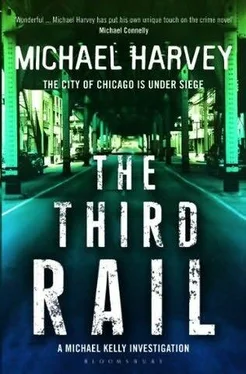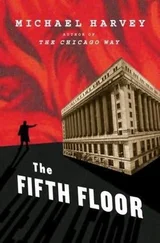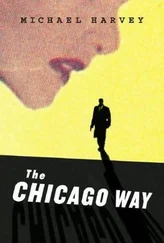Michael Harvey - The Third Rail
Здесь есть возможность читать онлайн «Michael Harvey - The Third Rail» весь текст электронной книги совершенно бесплатно (целиком полную версию без сокращений). В некоторых случаях можно слушать аудио, скачать через торрент в формате fb2 и присутствует краткое содержание. Жанр: Полицейский детектив, на английском языке. Описание произведения, (предисловие) а так же отзывы посетителей доступны на портале библиотеки ЛибКат.
- Название:The Third Rail
- Автор:
- Жанр:
- Год:неизвестен
- ISBN:нет данных
- Рейтинг книги:3 / 5. Голосов: 1
-
Избранное:Добавить в избранное
- Отзывы:
-
Ваша оценка:
- 60
- 1
- 2
- 3
- 4
- 5
The Third Rail: краткое содержание, описание и аннотация
Предлагаем к чтению аннотацию, описание, краткое содержание или предисловие (зависит от того, что написал сам автор книги «The Third Rail»). Если вы не нашли необходимую информацию о книге — напишите в комментариях, мы постараемся отыскать её.
The Third Rail — читать онлайн бесплатно полную книгу (весь текст) целиком
Ниже представлен текст книги, разбитый по страницам. Система сохранения места последней прочитанной страницы, позволяет с удобством читать онлайн бесплатно книгу «The Third Rail», без необходимости каждый раз заново искать на чём Вы остановились. Поставьте закладку, и сможете в любой момент перейти на страницу, на которой закончили чтение.
Интервал:
Закладка:
Rodriguez swung a hard right onto Inner Lake Shore Drive. Traffic was at a standstil. Rodriguez cut back west and picked his way south down Sheridan.
“We’re setting up a perimeter from Halsted Street east, along the lake from Addison to North Avenue. We’re getting some choppers up, and I got the description out there. If he didn’t jump in a car, we got a chance.”
“How many did he hit?”
Rodriguez shrugged. “Don’t know. But it doesn’t sound good.”
The detective smoked his tires taking a left off Sheridan and gunned it the wrong way down Diversey, to a dead end and a parking lot. It was less than five minutes since the last shot was fired. The lot had three cars in it. Al of them empty. Rodriguez and I pul ed our guns and moved to the soccer fields that lay just beyond.
“The area she described is just over the hil,” Rodriguez said. “I’m gonna go straight up. You circle around to the south. If he’s stil on foot, there’s a chance he headed that way.”
Rodriguez was right. If our shooter had headed north or west, he’d have to navigate a half mile’s worth of open ground. To the south was the parking lot. Beyond it, cover in the form of winding paths, trees, and a series of underpasses.
“Put me on your net so some cop doesn’t shoot me,” I said.
Rodriguez nodded. “You’re on it. Just don’t change clothes on me. Here, take a radio.”
The detective threw me a handheld and headed toward the hil. I checked the volume on the two-way to make sure it was squelched and started jogging south along a running path that skirted Diversey Harbor and Lincoln Park Lagoon. Two minutes and a hundred yards later, a dog stood at the top of a smal rise, wagging his tail for no apparent reason. I knew a little about dogs. Very little. My pup, however, rarely wagged without a reason, usual y because she saw something or someone. I pushed up the incline.
“What do we got here, boy?” I scratched the dog behind the ears. He wagged his tail even harder. Ahead, the jogging path dipped to the left and ran underneath a bridge that spanned Ful erton Avenue. I crept toward the black hole under the bridge. The dog stayed where he was. Smart dog.
CHAPTER 26
Robles wore navy-blue running pants, a blue hooded sweatshirt, running gloves, and a hat. He kept a snub-nosed revolver tucked in one pocket of his sweatshirt and a set of keys in the other. Ful erton Avenue above him was quiet. A chopper beat somewhere in the distance. Robles was twenty yards beyond the bridge when he heard someone cal out to the dog. Time was running thin. Nelson had stressed he’d have about ten minutes from his last shot to get to where he needed to be. That was seven minutes ago. Robles could have run for it, but he didn’t. Instead he veered off the path, into the scrub alongside the lagoon, and waited. He heard the crunch of gravel, the slosh of water, and the rumble of a garbage can as its cover was removed. A head peeked out from underneath the bridge. Then, a hand and a gun. Robles fired twice. A body fel back into the darkness. Robles looked around. There was a lot of swirl, but it was al stil a mile or so north, focused on the tragedy and neglecting the periphery. Just as Nelson had predicted. Robles stood up, brushed the dirt off his pants, and began to jog again. Fifty yards later, he found the building he was looking for, fitted a key into a lock, and disappeared inside.
The first round scored the pavement a foot or so to my left. The second knocked me to the ground. I knew I was hit and saw my gun lying in a puddle of water a few feet from my head. I struggled to my feet and wedged myself between a steel girder and a trash can. My right arm wouldn’t cooperate, so I reached for the gun with my left. Then I waited for the pain to settle. The air under the bridge was cold and damp. Water dripped down the wal s and pooled in the broken cement at my feet. I slipped my hand under my vest. It came away red, but the wound didn’t seem too bad. I gave it another ten seconds and crept out again. The running path was empty. Whoever had shot me was gone. I moved down to the water’s edge, slumped into the weeds, and looked out over the lagoon. A couple of ducks looked back. Then they flapped their wings and lifted into the air. Far above them another bird hovered. This one was a police chopper, scouring the shoreline. I waved, but it moved off. The water below was quiet, chunks of ice floating here and there. Around a soft bend in the shoreline, a single boat suddenly appeared, a kayak paddling out from the Lincoln Park Boat House, heading toward the lake. The kayaker wore a hat, gloves, and a dark sweatshirt. It seemed like an odd outfit, but then again, I had never kayaked through a Chicago winter. Didn’t know anyone who had. I inched back a little deeper in the scrub and watched some more. The kayaker was struggling with his stroke, unable to coordinate the lift and fal of the double-bladed paddle. After twenty yards or so, he smoothed out and began to move a little better. I stretched out on my stomach and lay flat on the ground. The man might have caught my movement, because he stopped paddling and leaned forward. For a moment, I saw the short shape of a gun, outlined against the hard winter gray. Then it disappeared back in the bottom of the boat. I held my nine in front of me with two hands. The blood flowed a little more freely down my side, but the pain had subsided, and my head was clearing. The kayak was moving again, from right to left, maybe fifty yards away. I knew I was at maximum range for my gun and squeezed down over the sight. The boat drifted closer and the shot got easier. I moved the gun from temple to jaw and then down over the mass of the kayaker’s body. The mayor’s face slipped across the edge of my vision. As did a federal agent, with a badge and a knowing smile. I tightened up another notch on the trigger. Then I exhaled and pushed back into the weeds.
My words tasted like dust, but I radioed in anyway and told Rodriguez about the boat. I could hear the rotor chop above me fade for a moment, then grow louder. They had drifted a bit north, but would arrive in plenty of time to cut off whoever our kayaker was. He continued his slow crawl across the lagoon. I pul ed the gun up again and tracked him. Just for fun this time. The kayaker ducked and paddled, stil a rough but steady stroke. His face turned once, as if he sensed something, and his profile flashed in a column of light. I lowered my gun. Then I heard a crack, and the kayaker’s chest exploded in a cloud of tissue and red.
Robles heard a pop and felt a tug at his throat. Then he was at the bottom of the kayak, staring up at the sky and choking on his own blood. Robles thought about the girl from last night. He’d enjoyed kil ing her. This morning on the Drive, even more. He thought about al the others, women struggling against the darkness, children submitting, smal graves in the woods. Those were his private treasures. His secrets. Today had been his glory.
Robles’ mind emptied, and fil ed again with a summer day. He was a kid gone fishing. The sun gentled and the boat rocked as the man moved in the bow and then settled, cigarette in one hand, line in the other. Robles remembered the trout he’d caught that day, silver and pink against the roughed-out bottom of the boat. The man gripped the fish, bel y down, and hit it twice with the rounded butt of a knife. Then he threw the trout into a rusty hold fil ed with water. Robles remembered looking into the wel, seeing the black eyes peering out from under. Then the lid closed, and the eyes were gone. The man returned to his perch and fel asleep. The boy remained where he was, breathing softly and watching the water move around him. Such were Robles’ thoughts as he looked up at the sky, lungs swol en with blood, police chopper drifting, and then nothing.
Читать дальшеИнтервал:
Закладка:
Похожие книги на «The Third Rail»
Представляем Вашему вниманию похожие книги на «The Third Rail» списком для выбора. Мы отобрали схожую по названию и смыслу литературу в надежде предоставить читателям больше вариантов отыскать новые, интересные, ещё непрочитанные произведения.
Обсуждение, отзывы о книге «The Third Rail» и просто собственные мнения читателей. Оставьте ваши комментарии, напишите, что Вы думаете о произведении, его смысле или главных героях. Укажите что конкретно понравилось, а что нет, и почему Вы так считаете.












